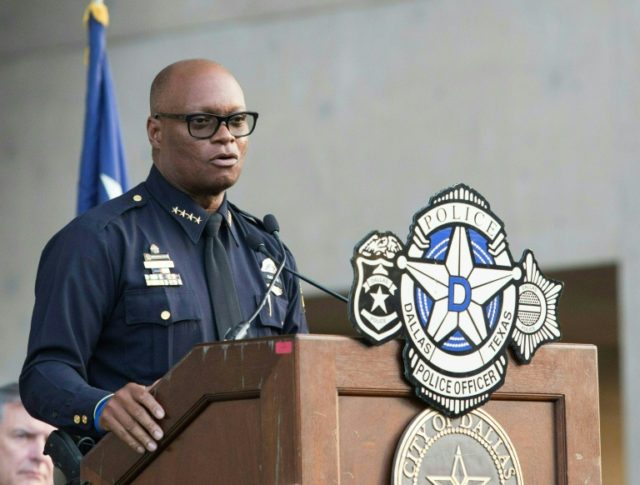Dallas Police Chief David Brown, who received nationwide praise for his handling of this July’s deadly police ambush that left five officers dead and nine injured at a Black Lives Matter protest, held a press conference Thursday to discuss his decision to retire.
Speaking at Dallas Police Headquarters for the first time since announcing his retirement online, Brown said, “I am retiring after 33 years of service” and “not resigning,” adding that as a third generation Dallasite: “It’s been an honor and it’s been humbling to serve as the Dallas police chief.”
He called his three decade career “quite a journey.” The chief wore a suit instead of his police uniform. Later, he commented August 2 marked his 33rd year on the force and the decision to retire tugged at him, but he added: “It’s time to go. That’s a long time to be somewhere.” He said, “I came here to serve in any capacity the department chose to assign me to. I really thought that being a public servant was a high calling.”
His retirement date of October 22 coincides with his 56th birthday. Brown stated: “Police chiefs in this city and in this country have a shelf life,” noting, “You really shouldn’t want to overstay your welcome.” He cited the average tenure for a police chief to serve in a city as three years.
Brown received national notoriety on July 7 when he made the unprecedented decision to use a bomb robot to kill gunman Micah X. Johnson, who opened fire on police killing five–four DPD and one Dallas Area Rapid Transit (DART) officer–and wounding nine other officers. At Thursday’s press conference, the humble Brown admitted that such attention associated with the atrocity made him feel uncomfortable.
“The idea of some notoriety related to a tragedy making me untouchable was distasteful to me,” he said.
Some of his harshest critics over the years have been the news media. Yet, he said, “The job of a public servant is to be criticized.” Brown thanked reporters for “challenging” him during his tenure. “Like Thomas Jefferson said, ‘I’d much rather have the free press and no government than government and no free press,” he remarked, asking media tell both sides of the story and challenge their own sources as much as they scrutinized police facts.
Although the city’s top cop acknowledged he would like to inspire people on a national level post-retirement and has received numerous opportunities, he intended to keep these offers private at this time. Lightheartedly, he quipped if reporters pressed him he would respond, “It’s between me and my baby, unless you are my new baby.”
He also said: “I have no regrets.” Brown reflected on being a 22-year-old who, in 1983, dropped out of the University of Texas at Austin, to become a police officer. He wanted to bring about change from the inside to his own south Dallas inner city neighborhood of Oak Cliff, then fraught with a crack cocaine epidemic. He underscored as a police officer, “I made my mom proud of me.”
Brown called Dallas an example to the nation, calling his time in DPD rewarding. The 33-year law enforcement veteran has led the nation’s seventh-largest municipal police force in the nation. He suddenly announced his decision to step down last week online over the Dallas Police beat bulletin. His departure caught many in Dallas off guard and he promised to hold this press conference to explain.
Breitbart Texas reported Brown said he came to the “difficult” decision to retire following “much prayer,” also noting: “Serving the citizens of Dallas in this noble profession has been both a true honor and a humbling experience.”
Following the July 7 attack on Dallas police, Brown offered Black Lives Matter protesters a more constructive channel to change the world. “Become a part of the solution,” he said in a July 11 press conference. “Serve your communities. Don’t be a part of the problem. We’re hiring. We’re hiring. Get off that protest line and put an application in, and we’ll put you in your neighborhood, and we will help you resolve some of the problems you’re protesting about.”
At the press conference, Brown addressed these comments, saying he believes a most effective way is to get civilians engaged and bridge gaps, especially for young people of color, is to mind their neighborhoods.
Brown said that before and after July 7, many supported DPD, including former President George W. Bush and former First Lady Laura Bush, who attended the slain officers’ memorial this summer along with President Obama, First Lady Michelle Obama, the Texas delegation, and other high ranking public officials.
“President George W. Bush and Laura Bush have encouraged me from day one. They have been staunch supporters,” he said, sharing that the former president visited his church “quite a bit” and reached out to him after Brown’s son’s tragedy. In 2010, just seven weeks after assuming the role of police chief, Brown’s son was killed in a police shootout.
On September 1, Dallas Mayor Mike Rawlings described Brown as “a straight-forward man, a man of integrity, and of courage,” a “man that believes in the simple proposition to do what is right and treat everyone with respect” and a “man of faith who loves his family deeply.” At the time, Rawlings commended Brown for the city’s largest crime reduction under his leadership, although his earlier in the year, the Brown faced sparring with police unions over unpopular scheduling shifts to take on a troubling crime spike, Breitbart Texas reported.
Dallas Assistant Police Chief David Pughes will assume the role of interim police chief once Brown leaves the force. Rawlings said they will conduct a national search to find the “best and the brightest chief” to take over the department’s leadership.
Follow Merrill Hope, a member of the original Breitbart Texas team, on Twitter.

COMMENTS
Please let us know if you're having issues with commenting.